Summary of the conference:
Challenges to religious identity in public life - between art and medicine
Thank you for participating in the conference, which took place on November 4-5, 2021 in Toruń at the John Paul II Dialogue Center. We hope that this event extended your knowledge and raised awareness about current scale of challenges to protection of religious freedom in various spheres of public life.
We invite you to get acquainted with video materials containing presentations of the speakers during the conference and photo gallery of the entire event, which can be found below.
The aim of the conference organized by the Laboratory of Religious Freedom was to undertake an in-depth, multi-faceted discussion on the proper ways of respecting and protecting religious identity in public life, not only at the national but also global level. The event was attended by twenty-seven experts representing various scientific disciplines, both from Poland and abroad (USA, Great Britain, the Netherlands, Norway, Spain, Italy, Slovenia). Their interdisciplinary contributions, accompanied by lively debates, focused on three main themes:
religious identity in public life
religious freedom in art
relifious freedom in medicine
VIDEO RECORDINGS
OPENING OF THE CONFERENCE
The conference was inaugurated by the Deputy Minister of Justice Dr. Marcin Romanowski together with Fr. Dr. Tomasz Huzarek - president of the "Pro Futuro Theologiae" Foundation and head of the "Religious Freedom Laboratory" project.
RELIGIOUS IDENTITY IN PUBLIC LIFE
Erosion of Orthodoxy: Cultural Threats to Religious Freedom in Law, Politics and Education
Dr David Trimble, Religious Freedom Institute, Washington, USA
How We Got Here: A Brief and Biased History of Religious Freedom
Prof. John Perry, University of St Andrews, United Kingdom
A post-secular context for re-defining religious identity and mission
Prof. Lluis Oviedo, Antonianum University, Rome, Italy
Freedom of Religion or Belief: A Challenged and Challenging Right
Ed Brown, Stefanus Alliance International, Norway
The digital challenge to freedom of religion or belief
Prof. Marco Ventura, University of Siena, Italy
When violations of the right to freedom of religion or belief amount to genocide
Dr Ewelina Ochab, Coalition for Genocide Response, United Kingdom
Prezentacja „Raportu naruszeń prawa do wolności religijnej w Polsce” Laboratorium Wolności Religijnej
dr Przemysław Komorowski, Laboratorium Wolności Religijnej, Polska
Bitwa o wolność religijną: perspektywa historyczna i porównawcza
dr Grzegorz Blicharz, Uniwersytet Jagielloński, Kraków
Religious exclusivism and political pluralism
(on-line presentation)
Prof. Bojan Žalec, University of Ljubljana, Slovenia
Situation of children from religious minorities in Europe
(on-line presentation)
Rev. Prof. Piotr Mazurkiewicz, Cardinal Stefan Wyszyński University, Warsaw, Poland
Silenced voices: The international struggle for the human right of religious liberty
(on-line presentation)
Prof. David R. Hodge, Arizona State University, USA
RELIGIOUS FREEDOM IN ART
Blasphemy and Activist Art: Some Reflections of the Right to Provoke
Prof. Jeroen Temperman,Erasmus University Rotterdam, Netherlands
From 'Je suis Charlie' to the 'phobic' hysteria. Paradoxes of free speech
Prof. Fernando Simón Yarza, University of Navarra, Spain
Between religious freedom, insult and freedom of art: when the word hurts
Prof. Cristiana Cianitto, University of Milan, Italy
Art and attacks on religious freedom in 21st century in Spain
María García Ayuela, Observatory for Religious Freedom and Conscience, Madrid, Spain
Recording of parallel session: Respecting artists, protecting believers
1) Blasphemy and the Freedom of Expression: is there a "European standard"? Reflections on the E.S. v. Austria case (judgment of the ECtHR of 25.10.2018)
(on-line presentation)
Prof. Michał Balcerzak, Nicolaus Copernicus University, Toruń, Poland
2) Nicholas Wolterstorff and the Prospect of Shalom in American Public Schools
Jeffery S. Porter, Catholic University of America, Washington, USA
3) Freedom of artistic expression: some objective criteria of discerning beauty from obscenity
Aleksander Sztramski, Nicolaus Copernicus University, Toruń, Poland
4) Blasphemy Laws and Protection of Religious Sentiments vs. Freedom of Expression. An International Law Perspective
Dr Adam Jakuszewicz, Kazimierz Wielki University, Bydgoszcz, Poland
5) Contra Naturam: Sartre, St. Thomas Aquinas and the Technical Manipulation of Man
(on-line presentation)
Daniel Fitzpatrick (University of St. Thomas, Houston, USA)
RELIGIOUS FREEDOM IN MEDICINE
The conscience clause for the patient - is it needed?
Prof. Błażej Kmieciak, Medical University of Łódź, Poland
Conscientious objection in medical practice and the goals of medicine
Prof. Jakub Pawlikowski, Medical University in Lublin, Poland
Pluralism and Conscientious Objection. An Analysis of the Spanish Case
(on-line presentation)
Prof. Paloma Duran Lalaguna, Jaume I University, Castellón de la Plana, Spain
Prof. Consuelo Martínez-Sicluna, Complutense University of Madrid, Spain
Conscience wars in the USA in light of the SCOTUS judgments
Dr Weronika Kudła, Laboratory of Religious Freedom, Toruń, Poland
Pandemic and religious freedom
dr Roger Kiska, London's Christian Legal Centre, Izba Adwokacka stanu Michigan, United Kingdom
The Chair on Freedom of Religion and Conscience in Catalonia. Preliminary results and impact of the COVID-19 pandemic
Paula Martí i Lozano, Blanquerna Observatory on Media, Religion and Culture, Ramon Llull University, Barcelona, Spain
Freedom of religion and conscience during the COVID-19 pandemic. Analysis and comparison of the situation at European level
Verónica Israel Turim, Blanquerna Observatory on Media, Religion and Culture, Ramon Llull University, Barcelona, Spain
PHOTO GALLERY
Here you find the CONFERENCE PROGRAM and SPEAKER BIOGRAPHIES
Please send inquiries regarding recordings and other conference materials to the following address: conference@laboratoriumwolnosci.pl
The following speakers took part in the event:
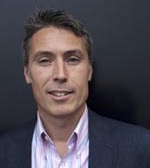
Ed Brown
Secretary-general of the Stefanus Alliance International. He was also the senior advisor at the Norwegian Helsinki Committee and Leader of the Norwegian Secretariat of the International Panel of Parliamentarians for Freedom of Religion or Belief (IPPFoRB). His fields of interest are human rights, freedom of religion or belief, minority rights, religious nationalism and identity politics, Islam, Hinduism and issues related to caste discrimination as well as broader rule of law and good governance issues. In addition, he is interested in building organizational capacity, good pedagogical approaches, and inspiring communication. He has a Bachelor of Arts in psychology from Pacific Lutheran University, a California Teaching Credential from Concordia University, Irvine, a major in religion from MF Norwegian School of Theology, a certificate of completion in International Human Rights Law from the Summer School at the University of Oxford and a nearly completed master’s degree in religion, society and global issues.
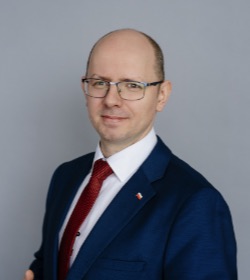
Błażej Kmieciak
Associate professor, habilitated doctor of legal sciences, holds a doctorate in sociology of law, he is also a graduate of rehabilitation and postgraduate studies in medical law and bioethics. He graduated from the School of Human Rights organized by the Helsinki Foundation for Human Rights and the School of Addiction Prevention in Warsaw. He is a mediator and has attended courses organized by Harvard University, Georgetown University and the United Nations on the practice of children’s rights and preventing violence against children. For eight years he was the Ombudsman for Patients’ Rights in a Psychiatric Hospital, he was also an expert for bioethics in the Ombudsman’s for Patients’ Rights Office. He was a member of the Team for the Protection of Family Autonomy and Family Life at the Ministry of Justice. He works at the Department of Medical Law of the Medical University of Lodz. From 2020, he is the Chairman of the State Committee for Paedophilia.
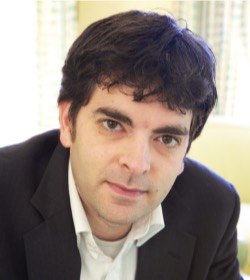
John Perry
Senior lecturer of theological ethics at the University of St Andrews. His PhD is from the University of Notre Dame and he previously taught for five years at the University of Oxford. For four years he has directed a grant in science-engaged-theology at the University of St Andrews. He primarily studies changes that occurred in the early modern period in ethics, theology and politics, and their enduring effects on today’s society. He is the author of The Pretenses of Loyalty and God, the Good and Utilitarianism. Some of his articles study such topics as euthanasia, the place of religious speech in politics, and religious freedom.
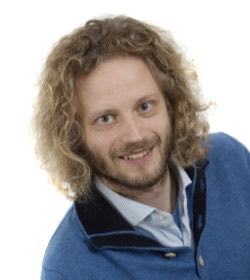
Jeroen Temperman
Professor of international law and religion and head of the Department of International and European Union Law at Erasmus School of Law, Erasmus University, Rotterdam, Netherlands. He is also the editor-in-chief of “Religion & Human Rights” and a member of the Organization for Security and Cooperation in Europe’s Panel of Experts on Freedom of Religion or Belief. He has authored, among other books, Religious Hatred and International Law and State–Religion Relationships and Human Rights Law. He edited Blasphemy and Freedom of Expression and The Lautsi Papers. Key publications further include articles published in “Human Rights Quarterly”, “Oxford Journal on Law and Religion”, “Netherlands Quarterly on Human Rights”, and “Annuaire Droit et Religion”. In 2014 he was awarded a Fulbright Scholarship, facilitating a visiting professorship at American University Washington College of Law. He has also been awarded two EUR-Fellowships, a Research Excellence Initiative grant, and recently was successful as main co-applicant under Horizon 2020.
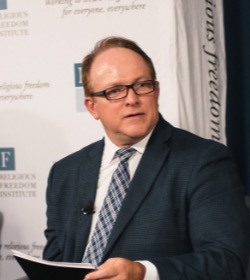
David K. Trimble
Vice president for public policy and director of Center of Religious Freedom Education at the Religious Freedom Institute in Washington. He holds a Juris Doctorate from Texas A&M University School of Law, Master of Divinity from Southwestern Baptist Theological Seminary, and a Bachelor of Arts from Campbellsville University. In addition, he has completed post-graduate studies at Southwestern and Baylor University. Prior to his work in Washington, he served as assistant professor of New Testament at Southwestern Baptist Theological Seminary. Throughout his career, he has focused on the intersection between religion and policy. He is internationally recognized for his religious freedom advocacy on behalf of ethnic and religious minorities worldwide and for his acute knowledge of the legislative process. With a degree in law, expert knowledge from working with the executive and legislative branches of the federal government at the highest levels, and years of teaching religion at the graduate level, he understands the critical role of education in stable societies as well as threats that challenge both academic and religious freedom.
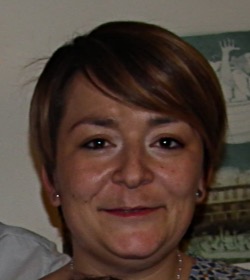
Cristiana Cianitto
Senior lecturer of canon law, ecclesiastical law, law and religion at the University of Milan where she also obtained a PhD from the Faculty of Law. Her research is focused on: canon law and Anglican canon law; comparative law of religions; freedom of religion and freedom of speech; hate speech and hate crimes in the USA, UK, Italy and India. She is secretary-general and member of International Consortium for Law and Religion Studies, member of Consociatio Internationalis Studio Iuris Canonici Promovendo and member of Associazione dei docenti universitari della disciplina giuridica del fenomeno religioso. She also works as a research associate at the Center for Law and Religion, University of Wales. She is member of the editorial board of “Quaderni di diritto e politica ecclesiastica”.
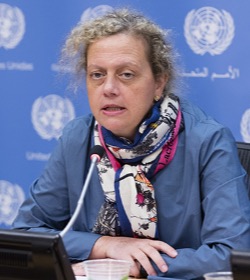
Paloma Duran Y Lalaguna
Professor of jurisprudence at the University Jaume I. She holds doctorates in law from the University of Navarra, canon law from the University of Navarra, and political science from UNED. She has been a professor at the Universities of Navarra, Valencia, Jaume I and Complutense of Madrid, as well as visiting professor at the Universities of Edinburgh, McGill, Entre Ríos, Columbia, and at the Human Rights Research Center of the Council of Europe. She is the former director of the Sustainable Development Goals Fund at the UN and former head of Global Partnerships and Policies Division, Development Co-operation Directorate in OECD. She acted as the United Nations Vice-Chair of the UN Commission for Social Development during her time as Counsellor of Human Rights in the Permanent Mission of Spain to the UN. Prior to that she has served on the EU’s Equality Committee and the Council of Europe’s Expert Group on Affirmative Action and worked with civil society in Nigeria, Guatemala, Peru, the Philippines, and elsewhere. She participated in many international meetings on human rights. She has authored more than 100 papers and books on human rights, which is her main area of work.
María García
Journalist, volunteer. She graduated in journalism and audiovisual communication at the Carlos III University of Madrid. Since 2009, she has been cooperating with the Observatorio para la Libertad Religiosa y de Conciencia, of which she has been the president since 2012. She also cooperates with the Red Solidaria Internacional ARCORES association.
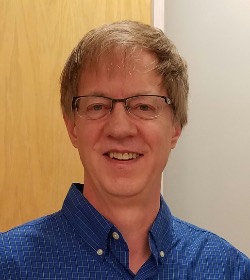
Doktor David R. Hodge
Professor in the School of Social Work at Arizona State University. He also holds non-resident appointments at the University of Pennsylvania, Baylor University, and Duke University. His research focuses on spirituality, religion and culture, especially as these interrelated constructs intersect health and wellness among vulnerable populations. He is a Fulbright scholar, and a fellow in both the American Academy of Social Work and Social Welfare and the Society for Social Work and Research. His latest book, by Columbia University Press, is titled Spiritual Assessment in Social Work and Mental Health Practice.
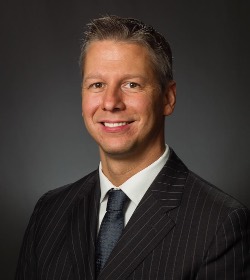
Roger Kiska
Solicitor for England and Wales and a member of the Michigan State Bar. He is legal counsel for the Christian Legal Centre (London). He has acted in numerous cases before the European Court of Human Rights and the Court of Justice of the European Union. He has also served as an elected member of the advisory panel of the European Union’s Fundamental Rights Agency. In 2012, he received the prestigious Scandinavian Human Dignity Award for his legal contributions towards human rights. In 2019, he was recognized by the Slovak Association of Family Judges for his work on behalf of families. He is a frequent contributor to television and radio, including BBC, Sky News, Channel 5, and ITV.
Paula Martí
Coordinator and researcher for the Chair on Freedom of Religion and Conscience in Catalonia. She holds a master’s degree in peace, conflict, and security studies and a bachelor’s degree in international relations from Blanquerna (Ramon Llull University). She conducted research on the right to religious freedom in Africa for the Religious Freedom in the World Report 2021 of Aid to the Church in Need International (ACN). She also has experience in the human rights sector in New York, Geneva, and Bogotá.
Consuelo Martinez-Sicluna
Professor of philosophy of law at the Law School of the Complutense University of Madrid, of which she has been vice dean of students. She holds a PhD in law and a diploma of advanced studies in modern history. She is a former director of the Department of European Union and the Mediterranean Law at EuroMediterranean University Institute and a current member of the presidency council of the Institut International d'Études Europèennes Antonio Rosmini. She also works as a visiting scholar for the Royal Academy of Jurisprudence and Legislation of Madrid and for the Royal Academy of Sciences, Fine Letters and Noble Arts of Córdoba. She is an author of many publications and recipient of different awards on jurisprudence and history.
Piotr Mazurkiewicz
Polish Roman Catholic priest, professor of social sciences, academic teacher at the Cardinal Stefan Wyszyński University (UKSW) in Warsaw, secretary-general of the Commission of the Bishops’ Conferences of the European Union COMECE in 2008–2012. He defended his doctoral dissertation at the Faculty of Ecclesiastical Historical and Social Sciences at the Academy of Catholic Theology in Warsaw. He is a member of the Scientific Council of the Institute of Political Studies of the Polish Academy of Sciences and the editor-in-chief of the magazine “Christianity-World-Politics”. He was the director of the UKSW Institute of Political Science and the dean of the Faculty of Social and Economic Sciences. He published, inter alia, books: Kościół i demokracja, Europeizacja Europy. Tożsamość kulturowa Europy w kontekście procesów integracji, Przemoc w polityce, Dwie wieże i minaret. Szkice z katolickiej nauki społecznej.
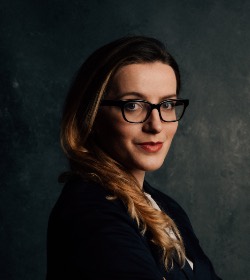
Doktor Ewelina U. Ochab
Human rights advocate, author and co-founder of the Coalition for Genocide Response. She works on the topic of genocide, with a specific focus on the persecution of ethnic and religious minorities around the world, with main projects including the Daesh genocide in Syria and Iraq, Boko Haram atrocities in West Africa, the situation of the Rohingya Muslims in Myanmar and of the Uyghurs in China. She has written over 30 reports for the UN (including Universal Periodic Review reports) and has made oral and written submissions at the Human Rights Council, the UN Forum on Minority Issues, PACE and other international and regional fora. She authored the initiative and proposal to establish the UN International Day Commemorating Victims and Survivors of Religious Persecution. The initiative has led to the establishment of the UN International Day Commemorating the Victims of Acts of Violence Based on Religion or Belief on August 22.
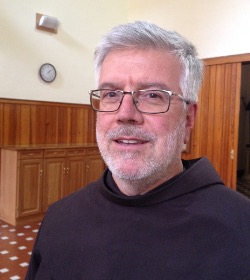
Lluis Oviedo
Full professor for theological anthropology at the Pontifical University Antonianum of Rome and fundamental theology at the Theological Institute of Murcia. He holds a doctorate in theology with a specialization in fundamental theology from the Pontifical Gregorian University of Rome, where he has also taught from 2003 to 2010. He currently leads a project titled “Interdisciplinary and Empirical Theology” at the Pontifical University Antonianum, which focuses on the dialogue of theology with the human and social sciences, and was a team member of the project on human specificity, funded by the Templeton Foundation. Currently, he edits the Springer Series New Approaches to the Scientific Study of Religion. He has published the books: Secularization as a Problem; Altruism and Charity; The Christian Faith and the New Social Challenges; and is a co-editor of the Encyclopedia of Sciences and Religions. His research focuses on the new scientific study of religion and its theological impact, and issues about secularization and religious social dynamics.
Jakub Pawlikowski
Assistant professor at the Department of Ethics and Human Philosophy of the Medical University of Lublin. He graduated from medical studies at the Medical Faculty of the Medical Academy in Lublin, philosophy studies at the Faculty of Philosophy of the Catholic University of Lublin and doctoral studies in law at the Faculty of Law, Canon Law and Administration of the Catholic University of Lublin. In 2008 he obtained a doctoral degree, and in 2014 he habilitated in medical sciences. He completed a specialization training in public health, obtaining the title of specialist in 2011. He is a founding member of the Polish Bioethics Society. Since 2013, he has been a member of the Transparency Council by the President of the Agency for Health Technology Assessment. Appointed by the Ministry of Science and Higher Education as a member of the Advisory Team for the protection of human rights in the context of the development of biological and medical sciences.
Verónica Izrael Turim
PhD candidate in communications and master in cultural communications and production at Blanqerna (Ramon Llull University). She also holds an Honours Bachelor’s degree in communications from ORT Uruguay University. She works as a guest lecturer at Blanquerna, Faculty of Communication, where she is also a member of the STReaM (Society, Technology, Religion and Media) research group. She co-authored a book titled Information Technology and Systems. In her research, she deploys such methodologies as social media data analysis, in-depth interviews, qualitative analysis.
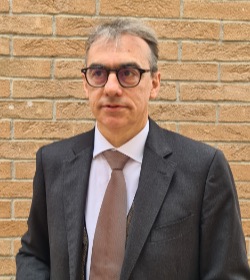
Marco Ventura
Professor with tenure in law and religion, religious diplomacy, and religion and communication at the University of Siena and the director of the Centre for Religious Studies at Fondazione Bruno Kessler of Trento. He obtained his PhD at the University of Strasbourg. His main field of interest is investigating and enhancing the interaction of religion and innovation. He is an associate researcher at the centre Droit, Religion, Entreprise et Societé of the University of Strasbourg and at the French National Research Council as well as a member of the advisory council of the Cambridge Institute on Religion and International Studies. Since 2016 he participates in the works of the panel of experts on freedom of religion or belief of OSCE/ODIHR. In this capacity, he co-authored the 2019 OSCE/ODIHR policy guidance on freedom of religion or belief and security. In 2019 he was the annual president of the European Consortium for Church and State Research. He co-authored the 2017 report on freedom of religion or belief and religious tolerance for the EU Parliament Intergroup on FoRB&RT.
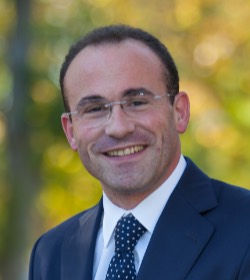
Fernando Simón Yarza
Associate professor at the University of Navarra. In 2010, he concluded with honours his PhD in human rights and environmental protection. The research was awarded the prestigious “Tomás y Valiente Prize 2011”. He was visiting scholar at the University of Münster and at Boston University. He was visiting fellow of the James Madison Program in American Ideals and Institutions at Princeton University. He has delivered lectures and participated in conferences in several Spanish and foreign universities and academic centres. He has published in the fields of constitutional law and legal philosophy, including issues related to religious freedom and free speech. He has also translated into Spanish several works of the German philosopher Robert Spaemann. He is a member of the Asociación de Constitucionalistas de España and of the James Madison Society at Princeton University.
Bojan Žalec
Research worker and lecturer at the Faculty of Theology of the University of Ljubljana, where he is also the head of the Institute of Philosophy and Social Ethics. He was the president of the Slovenian Philosophical Society. Since 2018, he is a real member of the European Academy of Sciences and Arts (Salzburg residence) and a member of many other scientific associations at home and abroad. His main research areas include philosophy of mind, philosophical anthropology, ethics, social and political philosophy, philosophy of religion and culture, and the history of Slovenian philosophy. He was visiting lecturer at the University of Zagreb and visiting scientist at the Polish Academy of Sciences in Warsaw. He has published over 160 scientific publications.

